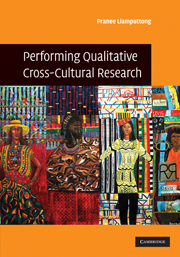Book contents
- Frontmatter
- Contents
- Preface
- About the author
- About the book
- 1 Performing qualitative cross-cultural research: an introduction
- 2 Moral and ethical perspectives
- 3 The research participants: accessing and reciprocity
- 4 Cultural sensitivity: a responsible researcher
- 5 Insider/Outsider perspectives and placing issues
- 6 Cross-cultural communication and language issues
- 7 Personal and collective testimony
- 8 Local knowledge, local power and collective action
- 9 Writing and disseminating in cross-cultural research
- In closing …
- References
- Index
- References
3 - The research participants: accessing and reciprocity
Published online by Cambridge University Press: 05 June 2012
- Frontmatter
- Contents
- Preface
- About the author
- About the book
- 1 Performing qualitative cross-cultural research: an introduction
- 2 Moral and ethical perspectives
- 3 The research participants: accessing and reciprocity
- 4 Cultural sensitivity: a responsible researcher
- 5 Insider/Outsider perspectives and placing issues
- 6 Cross-cultural communication and language issues
- 7 Personal and collective testimony
- 8 Local knowledge, local power and collective action
- 9 Writing and disseminating in cross-cultural research
- In closing …
- References
- Index
- References
Summary
Gaining access into marginalized communities is not an innocent undertaking; such entries are always fraught with ethical considerations.
(Subedi 2007: 56)Gaining access to potentially hard to reach populations is a great challenge. Some groups are not only hard to reach geographically but may also be culturally, socially, or developmentally resistant to participating in … studies'.
(Lindenberg et al. 2001: 135)How do we make contact with individuals and ask them to participate in our research, particularly if they do not wish to be found? Locating potential research participants can be a challenging and often problematic task. Many people are reluctant to enter the research field, as they do not ‘trust the researchers’, and may have other priority concerns (Liamputtong 2007a). Some groups, such as Hispanic Americans, have high mobility rates due to their employment and other issues and hence locating these groups can be a great challenge to researchers (Lange 2002). Because of this, recruiting research participants can be a formidable task for those carrying out cross-cultural research, and particularly so when the research is involved in sensitive issues.
In this chapter, I shall discuss several issues relevant to accessing potential research participants. I also provide some strategies which will assist researchers to gain access to and maintain relationships with the participants, so that their research projects may run successfully.
- Type
- Chapter
- Information
- Performing Qualitative Cross-Cultural Research , pp. 58 - 85Publisher: Cambridge University PressPrint publication year: 2010
References
- 1
- Cited by



